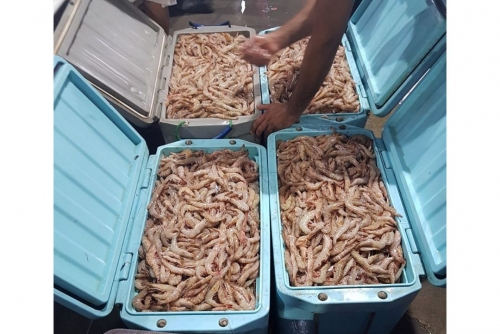The Public Prosecution for Ministries and Public Entities in Bahrain has recently concluded investigations into an illegal shrimp fishing case involving the use of prohibited bottom trawling nets. The investigation was prompted by a report from the Coast Guard, which led to the detention of a Bahraini man who was found with three coolers filled with fresh shrimp in his vehicle. It was discovered that the shrimp were caught by individuals of Asian nationality who had coordinated with the accused to use bottom trawling nets for fishing. The accused allegedly facilitated their illegal activities by providing his boat.
Upon receiving the report from the Coast Guard, the Public Prosecution swiftly initiated an investigation and charged the accused with complicity in the illegal shrimp fishing operation. During interrogation, the accused confessed to the offenses. The prosecution also gathered testimonies from witnesses and ordered the detention of the accused, as well as the seizure of his vehicle and boat. The case has now been referred to the Lower Criminal Court for further proceedings.
The Head of the Public Prosecution emphasized the importance of adhering to legal regulations aimed at protecting marine resources. Marine resources are essential for the sustainability of Bahrain’s natural environment, and illegal activities such as bottom trawling can have a detrimental impact on the ecosystem. It is crucial for individuals to respect and abide by the laws in place to ensure the preservation of marine life and the overall health of the environment.
The case serves as a reminder of the consequences of engaging in illegal fishing practices and the role of law enforcement agencies in enforcing regulations to protect marine resources. By holding individuals accountable for their actions, authorities can send a strong message against illegal activities that threaten the balance of the ecosystem. The swift response from the Public Prosecution in this case demonstrates the commitment to upholding environmental laws and holding perpetrators responsible for their actions.
It is essential for individuals, regardless of their nationality, to be aware of and comply with regulations related to fishing and marine conservation. Bottom trawling, in particular, has been identified as a harmful fishing method that can cause long-term damage to marine habitats and populations. By enforcing strict measures against illegal practices, authorities can help safeguard marine resources for future generations and promote sustainable fishing practices.
In conclusion, the recent illegal shrimp fishing case in Bahrain highlights the importance of protecting marine resources and enforcing laws to prevent illegal activities. The collaboration between the Coast Guard and the Public Prosecution resulted in the apprehension of the accused and the initiation of legal proceedings. By upholding regulations and holding individuals accountable, Bahrain is taking a proactive stance towards marine conservation and environmental protection. Adherence to laws and regulations is crucial in preserving marine ecosystems and ensuring the sustainability of natural resources for future generations.











